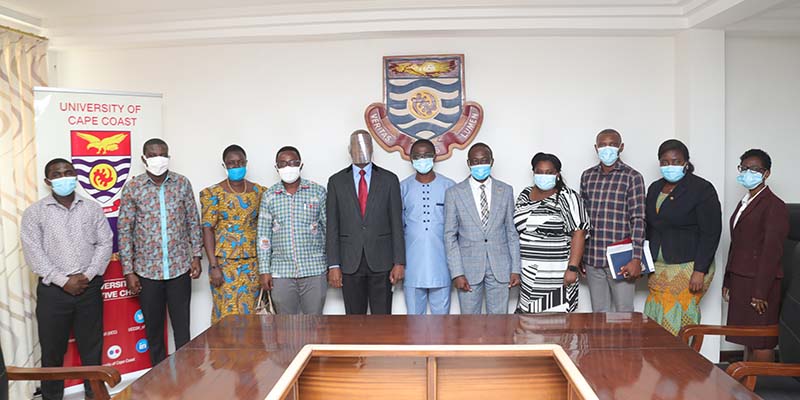The Vice-Chancellor, Prof. Johnson Nyarko-Boampong and the Registrar, Mr. Jeff Teye Emmanuel Onyame, have held separate meetings with the executives of the various unions on campus.
The Unions are the Ghana Association of University Administrators (GAUA), University Teachers’ Association of Ghana, (UTAG), Senior Staff Association, Universities of Ghana- (SSA-UoG)-UCC branch, and the Teachers and Education Workers Union, (TEWU).
The essence of the meetings was to elicit the support of the various unions and also get their inputs on board to help achieve the aims of the Vice-Chancellor’s vision for the University for the next four years.
GAUA
During the meeting with GAUA, Prof. Boampong called on members of the Association to come on board and work together to achieve his vision outlined for the University during his four-year tenure as Vice-Chancellor.“We call for your support to work together, let us work together to get the University to where we all want it to be”, he stated.
Speaking on the issue of motivation, Prof. Boampong indicated that it was their aim to motivate all members of staff so they would give off their best in terms of output. He indicated that: “When people are motivated then we can demand productivity”.
In his remarks, the National President of GAUA, Mr. Kwabena Antwi –Konadu, commended Management for the opportunity to discuss issues with the leadership of the association and pledged the support of members to help move the University forward. The President of GAUA appealed to Management to seriously consider issues concerning promotion of members. To this end, Mr. Antwi-Konadu urged them to look at the promotion document critically so as to deal with all the grey areas to engender a peaceful industrial environment. “It should not always be only paper consideration but real output and experience should also be counted and not trivialised”, he emphasised.
GAUA executives urged Management to ensure that Vice-Chancellors’ Ghana appealed to the Fair Wages and Salaries Commission to reconsider its decision to withdraw responsibility allowance for some Senior Members (non-teaching) who head sections because they were unqualified due to their present ranks.
The Registrar, Mr. Onyame responding to a suggestion for Management to avail themselves to the unions, said they were running an open- door policy and therefore, leadership of the unions could call on them whenever the need arose.

UTAG
During the meeting with the executives of the University Teachers’ Association of Ghana, (UTAG) the Vice-Chancellor reiterated his call for their support to manage the University since they were important stakeholders. “You are a key stakeholder group; therefore, you are expected to help us with useful suggestions and support to do the work for the University”, he appealed.UTAG led by its president, Dr. Samuel Bert Boadi-Kusi, assured that they would do their best to support the new regime to take the University to a different level.
TEWU-SSA-UoG
The Vice-Chancellor and Registrar also met the executives of both Senior Staff Association-UCC and the Teachers and Education Workers Union. He called for partnership in expanding infrastructure for the University. Presidents for both SSA-UCC and TEWU assured Management that they were ready to contribute in that direction.

